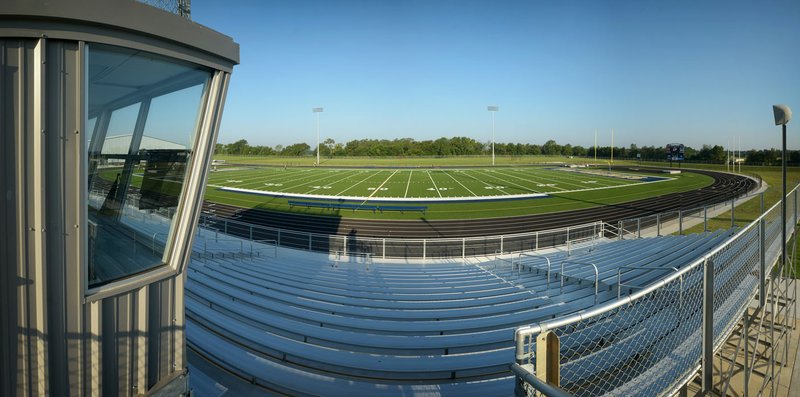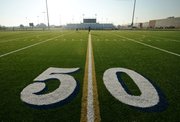BENTONVILLE -- The School Board's surprise decision last week to earmark nearly $2 million toward completion of a stadium at West High School delighted some and dismayed others.
The board approved putting $1,976,000 into the stadium project, a move School District officials believe will jump-start a fundraising campaign led by athletic director Scott Passmore.
Enrollment
West High School ended the 2016-17 school year with about 1,228 students. Enrollment as of July 3 was 1,767. The substantial growth is a result of the school adding a senior class for the 2017-18 school year. West High School served only grades nine through 11 during its first year.
Bentonville High School ended May with 3,345 students. Its enrollment as of July 3 was 3,163.
The school district’s enrollment as of last week was 16,868, an increase of 259 students since October. That number is certain to start climbing rapidly as the first day of school approaches, said Tanya Sharp, executive director of student services.
Source: Staff report
Passmore said he'd likely need to raise another $2 million for everything the school needs to host varsity football games on its campus. The varsity team plays its home games at Bentonville High School's Tiger Stadium, seven miles from its Centerton campus.
West has some football facilities already in place. The football field includes bleachers and a press box on the visitors side. The vision of a completed stadium includes home side bleachers and press box, concession stands, restrooms and home and visitor ticket booths.
The stadium, as it is, is not qualified to host varsity football games, though it is suitable for practices and games below the varsity level.
Bryan Pratt, West High School's head football coach, said completing the stadium would complete the school, which is entering its second year.
"It's a big deal to our kids. It's a big deal to our school. It's a big deal to this community," Pratt said.
Principal Jonathon Guthrie agreed.
"People out here in Centerton have been so supportive of our school. They want a place to come. That's where this town will be on Friday nights," he said.
Centerton Mayor Bill Edwards, who said he attended all but one of the school's football games last year, said the stadium should have a positive economic impact on his city.
"People will come and eat at our restaurants and buy gas there and stuff like that," he said. "I know those games are very well attended."
Some board members and others, however, questioned not only whether the board was right to allocate money to the stadium, but also how the decision was made.
Controversy
The topic was not on the School Board's agenda for Monday's meeting. Willie Cowgur suggested adding it at the start of the meeting, and the board voted 5-2 to do so. Members discussed the topic for nearly 40 minutes before voting 5-2 in favor of the $1.97 million allocation.
Joe Quinn and Matt Burgess were the dissenting votes in both cases.
Cowgur said the district could use $1.6 million from the recent sale of land on Bright Road and an additional $376,000 left over in a capital projects budget to boost the stadium fundraising effort.
"I really think it's the right thing to do for the district, for Bentonville West, for (Bentonville High School), for the students, not only athletes but the band, the community, for parents of kids who go there. I think it's the right thing to do," Cowgur said.
Quinn strongly objected to voting without notifying the public in advance.
"This was a calculated tactic to cut public input out of the process," Quinn wrote in an email to the Northwest Arkansas Democrat-Gazette on Thursday. "For me, voting no was voting yes for open and responsive government, and it was by far my proudest moment yet as a school board member. I have been humbled by how many people have called to say thanks."
Burgess said during the meeting he'd like to wait and see how the district's growth projections play out over the next year or two before making a financial commitment to the stadium.
The district devised a facility plan last year based on a projection of 3.5 percent annual enrollment growth. Enrollment relates to finances because the state provides school districts funding on a per-student basis. Bentonville needs about another 330 students to reach enrollment of 17,200 and hit the 3.5 percent growth projection for the 2017-18 school year.
District voters approved a 1.9-mill tax increase in May to pay for construction of two elementary schools, a middle school and a junior high school.
Grant Lightle, who served on the board from 2012 to 2016, publicly questioned the district's intentions before the election, sharing his fear the board would put money into West High School's stadium if the millage passed. He said he voted for the millage increase only after district officials insisted they had no plans to use millage dollars on a stadium.
"I wish I could have my vote back," Lightle said.
The district issued a statement immediately after Monday's meeting reiterating a promise Superintendent Debbie Jones made before the election that money from the tax increase would go strictly toward building the four schools.
Lightle scoffed at the message.
"If you tell people you need their money and find money for something else, don't expect them to give you money in the future. It's not going to happen," Lightle said. "People understand the money is all the same."
Brent Leas, a board member from Bella Vista running for re-election this year, was among those who voted for the stadium allocation. Amy Gillespie, his opponent, criticized the move in a post on Facebook.
"There's a reason there's a fundamental distrust of our school board and this hastily added, no public comment allowed, $2 million expenditure is it," Gillespie wrote.
Leas said the board didn't seek money for a stadium in the millage election of 2013 that provided money to build West High School, but added it's long been the board's desire to find money in the budget and complete the stadium "when it was possible."
Indeed, the topic has come up at past board meetings, including one in November. Travis Riggs, board president, suggested at that time putting $2 million into the stadium project.
Janet Schwanhausser, finance director, requested the board hold off on that decision a few months until some financial figures became more definite. Board discussion of the stadium did not re-emerge until last week.
Complex history
The question of how to pay for West High School's athletic facilities has been around since before the school was built.
A 2012 proposal of 6.7 mills would have raised about $128 million to build not only the district's second high school, but all of its athletic facilities. Districtwide upgrades to technology and heating and cooling improvements also were included in the proposal. It failed with about 58 percent of residents voting against it.
In response to a survey months after that election, 59 percent of respondents said they would support a second high school at a lower cost than what had been proposed.
The district took another shot at the issue in 2013, this time a 2.9-mill request that would pay for a second high school but not its athletic facilities. It passed with 70 percent voting yes.
West High School, however, ended up with many of the athletic facilities Bentonville High School has, including a baseball and softball complex, a field house, a track and a field for soccer and football. Savings achieved through competitive bidding and careful attention to building costs made those things possible, said Paul Wallace, facilities director.
"We ended up putting about 20 alternatives into that package just in case we came under budget," Wallace said. "So with the help of Flintco, with the budgeting and with a good bid on that, we ended up being able to get all of those packages within it. It wasn't just for athletics, it was for other items within Bentonville West."
An online fundraiser initiated last year for the stadium project had attracted $815 from nine people as of Friday.
Arguing for it
Rebecca Powers, the board's only Centerton resident, said she didn't feel like Monday's decision was rushed.
"I feel like we've been talking about this forever," she said.
Powers said she's not big on spending money on sports, but she believes culture is important to a school.
"And that culture is not as established when you don't have your own field and your own games," she said. "We owe it to the Wolverines. We've said from the very beginning this is what we wanted. We just didn't know how to do it and how to go about it. This seems like the right thing."
The district had been planning to spend about $1 million to "neutralize" Tiger Stadium to accommodate both Bentonville High and West High schools' teams, Passmore said.
That cost would have included adding dressing rooms for West High School and changing the turf, scoreboards and signage, Passmore said. Cowgur suggested the $1 million would be better spent finishing West High School's stadium.
Cowgur also recalled the board agreeing in 2013 to spend $1 million to help the city of Bentonville build a swimming pool at the Bentonville Community Center. The payment guaranteed permanent first-priority access to the pool for the high school's swim team.
The pool is "not even on our property," Cowgur said. "This is a cornerstone of a high school."
Cowgur was among those who voted for the pool expenditure in what was a 4-3 decision, which came exactly one month after voters had approved the millage increase for West High School.
Travis Riggs, board president, said he was all for putting money into the stadium. He said trying to raise all the money necessary for the stadium is a "tough challenge" for Passmore and implied the board was not living up to its responsibilities in ignoring the matter.
"We're not getting the job done that we need to get done," he said.
Superintendent Debbie Jones said she approved of the stadium allocation. She cited a healthy fund balance, the sale of land that no longer was useful to the district and growth revenue of $3.7 million that had not originally been factored into the budget. The state provides additional money to school districts based on how much their enrollment grows over the course of a year.
She also noted the expenditure doesn't interfere with a plan to give teachers a 1 percent raise this year.
"I would say this is a priority need," Jones said of the stadium. "It's much like an unfinished playground, an unfinished building. And why would the district not attempt to meet one of their primary needs when they have excess funds to be able to do that?"
NW News on 07/23/2017



